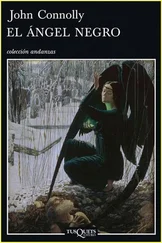“Now,” said Braun. “Do it.”
Slowly, Dupree moved his hand to his holster, flipped the clasp, and drew the gun out using his thumb and middle finger, as he had been told. The two strangers didn’t tense as he performed the action and he felt his heart sink. He had only read about people like this in newspapers and internal memoranda.
They were killers. Real, stone-cold killers.
“Lay it down on the floor, then kick it toward me,” said the man.
Dupree did as he was told. The man stopped the gun with his foot as it reached him. Beside him, the woman closed the door to the station house and turned the lock.
“Who are you?” asked Dupree.
“Doesn’t matter,” said Braun. “Tell me where your partner is at.”
“I don’t know.”
“Don’t fuck with me.”
“She’s out on patrol. I don’t know where she is exactly.”
“Call her.”
The man and woman moved in unison, keeping the same distance from each other as they advanced on Dupree in a ten-to-two position.
“She’s out of radio contact.”
Braun fired his gun, aiming to Dupree’s left. The shot blew a hole in the computer screen on the desk behind him.
“Why would you think I’m fucking with you, Andre? I want you to call her and bring her in.”
Dupree didn’t know if the radio was still out, but he had no plans to use it even if it was functioning again. Macy would be no match for these people if he brought her back here. The way things were looking, he was no match for them himself.
“I can’t do that,” said Dupree.
“You mean you won’t do it.”
“Comes down to the same thing. Why are you doing this?”
Braun smiled regretfully.
“You shouldn’t have fucked his wife,” he said.
He raised his gun and sighted down the barrel.
“You really shouldn’t have fucked his wife.”
Then, without warning, the lights went out.
Doug Newton was sitting downstairs in his favorite chair when the power died. His first reaction was that of most people on the island: he reached for a flashlight so he could check the fuse box. When the flashlight wouldn’t work, he went scouting for candles, eventually finding a pack of tea lights behind the spare bulbs in the kitchen cabinet. He dropped a tea light in an ashtray, lit it, then took a second candle and placed it on a saucer. His mother would be frightened if she woke and found that her TV wasn’t working. She liked the light from the tube, found it comforting. Her greatest fear, Doug believed, was that she might be alone when she died, and she would rather die with Nick at Nite than nobody at all.
Doug had just begun to climb the stairs when the candles flickered slightly and he felt the blast of cold air: a window was open. At the same instant a shuffling sound came from above, then a tapping that sounded like small bare feet running on boards.
Finally, he heard his mother cry out.
Doug knew that the cops, with the possible exception of Joe Dupree, hadn’t believed him when he’d told them about the little girl. Hell, Doug wasn’t too sure that he believed it himself, but he’d seen it and he was pretty certain his mother had seen it too, although she later convinced herself that it was just a dream. Ever since then, as he had admitted to Dupree, Doug had kept a pistol by his bedside and a loaded shotgun beside the hat stand in the hallway. He put the two tea lights down on the hall table and picked up the shotgun. Light filtered through the small square window at the first landing as he ascended the stairs, but he didn’t really need it. Doug knew this house: he’d been born here, lived here, and would die here, if he had his way.
His mother’s room was the second on the right. The door was slightly ajar, as it always was, and Doug thought that he could see shadows moving against the wall. From inside came the sounds of thrashing, and what might have been his mother softly whimpering.
Doug hit the door at a run, the shotgun at his shoulder.
The sheets had been thrown back from his mother’s bed and lay piled on the floor. Snow was blowing in through the open window, the flakes billowing and colliding with one another before falling gently on the carpet. The Gray Girl crouched over Doug’s mother, her mouth pressed against the old woman’s lips, while his mother’s thin arms and skeletal hands pushed at her, trying to force her away. Her hands caught in the folds of the Gray Girl’s gown, which appeared to move independently of the limbs it concealed. It seemed to be part of the girl, as though her body had fused with the shroud in which she had been interred, creating a new skin that hung over her arms like wings.
As Doug entered, the Gray Girl disengaged herself from his mother and swiveled her head in the direction of the intruder. He saw then that she was old, desperately old, a child in form only. Her hair, blond from a distance, was now clearly silver-white. Her cheeks were sunken and Doug perceived bone protruding through the parched skin below her eyes, which were entirely black. Her mouth was strangely rounded and Doug was reminded of a lamprey, a creature designed by nature to adhere to another creature and draw the life from it. Beneath the girl, he saw his mother’s face, her lips trembling and tears falling from her face. Her breathing was barely audible, and as Doug moved toward the bed, the light faded from her eyes and he heard the rattle in her throat as she died.
The Gray Girl hissed at Doug, and he saw the rage in her black eyes at what Doug had done, the distraction of his presence depriving her of that which she sought. Her hand reached out, her fingers little more than bone wrapped in tattered parchment.
And Doug fired.
The force of the blast blew the Gray Girl from the bed and tossed her against the wall. She rolled when she hit the floor, then rose up again and stood before him, framed by the window. The shot had torn holes through her gown and the skin beneath, but no blood came, and there was only a smear of gray tissue where she had struck the wall. She stood and regarded Doug with a malevolence that made him want to run and hide, to curl himself up into a ball in a closet until she went away. For an instant, Doug pictured himself cocooned, listening in the darkness, then hearing the pad of those feet as they approached and halted before his hiding place, the door being drawn slowly open as-
Doug fired again, and the gray child disintegrated into a cloud of moths.
The room was filled with snowflakes and insects and broken glass, and the sound of Doug Newton crying for his dead mother, and for himself.
Nancy Tooker was descending warily to the kitchen to get some food for her sister and the dogs when the lights went out. She was a big woman, as Officer Berman had not failed to notice, and once she missed her step, there was no way that she could keep her balance. She tumbled awkwardly down the stairs, striking the slate floor hard with her head and coming to rest with a sigh. Her sister cried out her name, then used both the wall and the stair rail to support herself as she descended to Nancy’s side. After a moment’s hesitation, the dogs followed.
There was blood flowing from a wound in Nancy’s head. A shard of bone had broken through the skin of her left arm and her left ankle was clearly broken. Her breathing was very shallow and Linda feared that her sister had done herself some internal damage that only a hospital could ascertain. She went to dial the station house number, but the line was dead. She switched the phone off, powered it up, then tried again, but there was still no tone.
Linda ran to the living room, where she removed the cushions from the armchairs and couches, and did her best to make her sister comfortable. She was afraid to move her, and wasn’t sure that she could have even if she’d wanted to, for Linda was sixty or seventy pounds lighter than her sister. Instead, she gingerly raised Nancy’s head and slipped a cushion beneath it, then tried to do the same for her arm and ankle. During the whole operation, Nancy moaned softly only once, when Linda placed a pair of cushions beneath her leg. That worried Linda more than anything else, because moving that leg should have hurt Nancy like a bitch. She went to the hall closet and removed all the coats she could find, then laid them across her sister to keep her warm. Their nearest neighbors were the Newtons, just on the other side of Fern Avenue. If she could get to them, she could use their phone, assuming that the problem with the phones hadn’t affected the whole island. She didn’t want to think about what might happen to Nancy if that were the case. Someone would just have to drive over to Joe Dupree and tell him what had happened so he could call for help from the mainland.
Читать дальше












